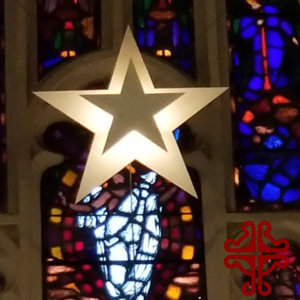
Let There Be Light
The people who walked in darkness have seen a great light; those who lived in a land of deep darkness– on them light has shined.
“Let there be light.” God’s first action in creation is calling light into being. In holy scripture, light is the sign of God’s presence.
Light is a recurring image in the readings of the Epiphany season. The stories celebrate God’s eternal action and presence, God’s continual breaking into history to transform the world through the lives of ordinary people.
These tales help us see how God breaks into our lives, claiming us as beloved children and inviting us more fully into the life of faith.
The life of faith calls us to changes: changing our minds, our ways of thinking and being (that’s what it means to repent), our way of seeing the world.
That may mean a change of venue, as it did for the Magi. They followed the light of a star far from their homelands to honor the child in the manger, God’s light in flesh. When he grew up, Jesus traveled, too, first across the Judean desert to his baptism in the Jordan River, then to Galilee to begin his public ministry and call his disciples. We’ll come back to that.
The Journey Inward
Whether the life of the spirit includes actual travel or not, it’s all about movement, the journey inward, the deep transformation of the soul that God brings about.
Often that transformation happens in mid-life, as it did for Dante. His Divine Comedy begins with the confession: mid-way in his life’s journey he had lost his faith.
There are many, many meditations on the spiritual quest. My current favorite is Falling Upward, Fr. Richard Rohr’s book on mid-life spiritual transformation. Today I’m just going to offer a tiny taste of Rohr’s wide-ranging riches.
Rohr takes off from Carl Jung’s idea of the two halves of life. In the first half, we are focused on building what Rohr calls the “container”. Answering the call of the ego, we strive for security, achievement, identity, tradition, community. The foundation we create then, that stability, prepares us for the crisis of faith that launches the second half; then we hear the call of the soul to the life of the Spirit.
Crisis of Faith
 One new dramatized example of such a crisis is in the Netflix series The Crown. As you probably know, The Crown is historic fiction. It’s a multi-part, multi-year program that imagines the personal relationships and interactions of the British royal family during the factual events of Queen Elizabeth II’s reign. The new, third series is set in the 1960s when the Queen and Prince Philip are in their 40s; the crisis of faith is Philip’s.
One new dramatized example of such a crisis is in the Netflix series The Crown. As you probably know, The Crown is historic fiction. It’s a multi-part, multi-year program that imagines the personal relationships and interactions of the British royal family during the factual events of Queen Elizabeth II’s reign. The new, third series is set in the 1960s when the Queen and Prince Philip are in their 40s; the crisis of faith is Philip’s.
He is an athletic, energetic man who feels that being the royal consort has limited him, kept him from making his own mark in the world. He is restless and dissatisfied with his life. Among other pursuits, Philip is a skillful pilot. He becomes captivated with the stunning achievement of the moon landing and walk in the summer of 1969.
Around this time, God comes gently into Philip’s life through Robin Woods, the new Dean at Windsor. Philip is a bit surprised and put off, but he agrees to let the Dean create a center for clergy spiritual renewal at Windsor Castle in an abandoned building. When the Dean invites Prince Philip to meet the first group of priests who have come there on retreat, Philip grudgingly goes. The priests, who are about his age, share with him their deep sense of failure: church attendance is dwindling and religion seems irrelevant. In reply, Philip rudely mocks them and challenges them to stop moaning and to act. Holding up the example of the astronauts, he says: “Action is what defines us, not suffering.”
But when the astronauts make a visit to Buckingham Palace and he has time alone with them, Philip realizes his mistake. No longer young like them, no longer satisfied with feats of strength or skill, he is looking for something much deeper: the meaning of his life.
Philip returns to the priests’ retreat, humbled and hesitant, admitting he needs their help. The cure for his restlessness is not in the stars, but in the faith he has lost. The light he seeks is within. And his first stop on the quest is a relatively modest building on his castle’s grounds.
A Big Decision
Jesus himself was called at midlife, as were the disciples he called in turn. Matthew implies that John’s arrest prompted Jesus into action. The gospel writer gives no reason why the disciples—Andrew and Simon, John and James–responded as they did to Jesus.
But it was a huge decision.
Answering God’s call, they not only began new lives, they had to die to the old one. The few words of the gospel text belie the enormity of it to us. But Jesus’ first followers would have grasped both the symbolic and the shocking practical reality.
Leaving their nets, Simon and Andrew abandoned the tools they used to feed their families. They left their trade, their professional experience, their livelihoods, their identities. James and John essentially betrayed their familial duty leaving their father alone with the business. They walked away cold.
Why? God’s light had dawned upon them. Like all their countrymen, the disciples labored under Roman oppression; it overshadowed everything. In Jesus, God brought the light of faith and hope, a new way of being, a new way of acting, a new way of seeing the world around them, a new sense of power to transform it.
“Heaven in [the] ordinary.” “Heaven in [the] ordinary” a line/an image from the 17th century priest/poet George Herbert. Jesus brought heaven to the disciples’ ordinary world. Then he stayed with them in their home region. Traveling together they shared that heavenly light of hope with one another and people all through the Galilee. Eventually, that light spread from one community to another, generation after generation, until it overwhelmed the Empire of Rome.
If you pay a lot of attention to the news, as I do, fears of the darkness of human violence and hatred can eclipse the light of God’s love in your own spirit. When it does, it’s time to stop and remember: these are not the worst of times—not by a long shot. And even in the worst of times God’s goodness has always triumphed, always overcome the forces of evil and darkness through the faith and action of ordinary people. People like us.
We are called to be the bearers of that light, to seek and kindle it in others. That happens as one encounter, one gesture, one prayer, one word or act of kindness adds to another and another.
My friend Casey Kelly lived in New York City in the scary time of the 1970s. She’s from Louisiana. She’s petite, pretty, and very openly friendly. Casey often got lost on the subway and instead of asking people who looked like her, she chose to ask directions from people who looked a bit scary themselves. Time and again she found they were startled, and replied smilingly. One day, she asked a man who had just gotten off a train. He directed her to the same one going in the other direction; then he got on, too. Concerned as the car they shared emptied out, she began to panic when he approached her. He pulled his hands from behind him and shyly offered her a small ragged bouquet as he said, “Just so you knows not everybody’s going to the dogs.”
Carry the light of God’s love with you every day and share it. Look for the light in people you meet and chances are good that you will find it.

